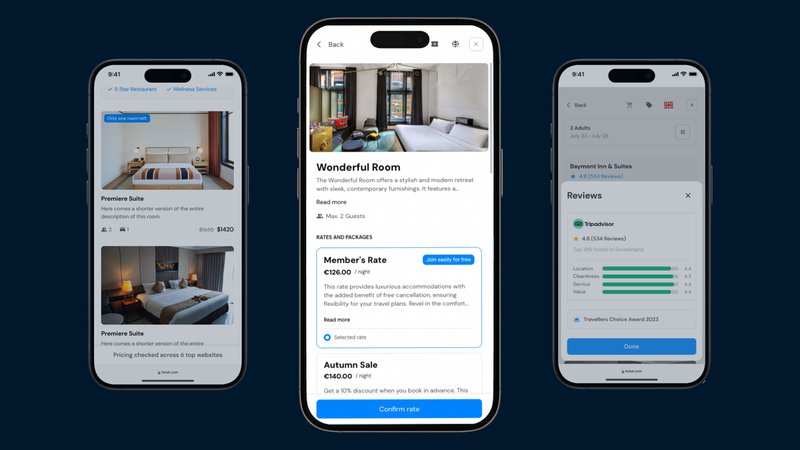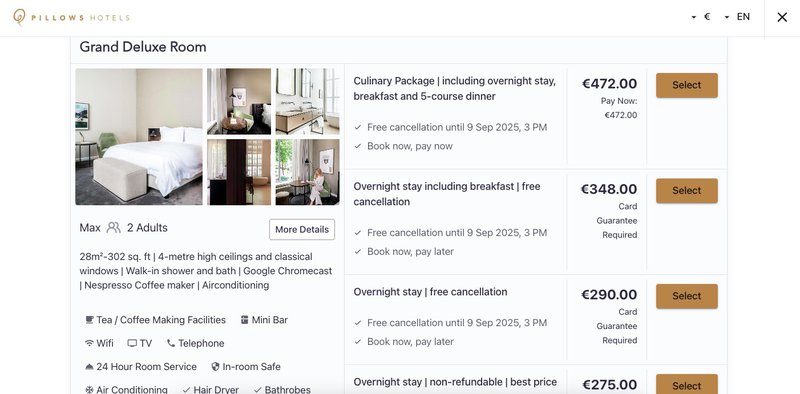If you’re running a hotel, you probably know the drill: OTAs (like Booking.com or Expedia) help fill your rooms, but they take a big chunk of your revenue; sometimes up to 30% per booking. That’s money you could be investing in your team, your property, and even guest experiences. A hotel booking engine gives you back control. It helps you keep more of your earnings, makes direct bookings easy, and gives your guests a smooth, branded experience from start to finish.
Let’s break down what it is, why it matters, and how to choose one that works for you.
What exactly is a hotel booking engine?
A booking engine for hotel websites (sometimes called an internet booking engine or IBE) is a simple tool that is offered to users who visit your website, much like booking an online table reservation at a restaurant. It lets potential guests check availability, pick a room, and book their stay; all without ever leaving your site. Unlike OTAs, which process bookings on their own platform and then send you the details, this engine communicates directly to your property management system (PMS), so your rates and availability are always up to date, saving you time and effort managing logistics with an OTA.
Here’s how it works:
- Guests select their dates: The engine checks your PMS and shows what’s available. This ensures availability and rates are 100% accurate, so there’s no risk of double bookings or wrong prices.
- Room and price selection: Guests see all their options; room types, packages, special deals. The engine calculates the final price, including any discounts or promo codes you’ve set up.
- Details and payment: Guests enter their info and pay securely. The engine uses strong encryption (typically using PCI-DSS–compliant encryption to keep data safe), so their personal information stays secured.
- Instant confirmation: Once payment is approved, the reservation goes straight into your PMS. Guests get a confirmation email right away, and your teams across all departments can see the booking instantly.
- Follow-up: Many booking engines have the ability to send out automated emails; reminders, upsell offers; you name it. This tells guests that you care about their experience and helps boost overall revenue.
Why should this matter to you?
A booking engine turns your website into a direct sales channel. It saves you time, reduces manual work, and gives your guests a smooth, professional experience from start to finish.

Why does your hotel need a booking engine?
1. Lower costs, more profit
OTA commissions are steep. Booking.com and Expedia typically charge 15–25%, and some OTA fees even reach 30%. Merely shifting a few reservations from an OTA to a direct booking on your website can save you thousands each year and protect your profit margins.
2. Better guest data
Direct bookings mean you get more than just a name and email. You get real guest insights: preferences, history, demographics. This lets you personalise offers (offer room upgrades to guests who previously booked deluxe rooms), launch loyalty programmes (reward points, free nights), and send targeted promotions (anniversary discounts, return-stay emails). It’s precisely how you turn one-time guests into seasonal regulars.
3. Mobile is non-negotiable
Over half of direct bookings now happen on mobile. If your online hotel booking engine isn’t lightning-fast and easy to use on a phone, you’re missing out. A mobile-first booking engine adapts to smaller screens, auto-fills fields where possible, and offers digital wallets like Apple Pay and Google Pay for fast, secure checkouts. In fact, mobile-optimised booking engines boost conversion rates by up to 30% compared to desktop bookings.
4. Trust and confidence
When the entire booking process happens on your website, from room search to payment confirmation, guests feel more confident in your brand. Consistent branding and secure payment badges build trust and reduce drop-offs. And to top it off, removing sketchy redirects and unwanted popups from the user experience also reduces the risk of cart abandonment, leading to more bookings.

How a Booking Engine Can Increase Direct Bookings
A direct booking engine does more than just display available rooms. It actively guides visitors through a smooth, user-friendly booking process, reducing friction and increasing the chances they’ll complete their reservation with you. Here’s how:
Streamlined booking process
Every extra step or click on your website can cause a potential guest to abandon their booking. A good booking engine simplifies the process to just a few easy steps: search for dates, select a room, enter details, pay, and confirm. This quick and intuitive flow keeps guests engaged and reduces drop-offs.
Exclusive offers for direct bookers
To encourage guests to book directly, you can offer special perks that aren’t available on OTAs, such as free breakfast, room upgrades, late checkouts, or loyalty points. Highlighting these exclusive benefits on your booking engine motivates guests to bypass third-party sites and book with you.
Real-time pricing and availability
Your booking engine connects directly with your Property Management System (PMS) and channel manager, ensuring that guests always see accurate, up-to-date room availability and pricing. This prevents double bookings and pricing discrepancies that can frustrate guests and damage trust.
Upselling opportunities
During the booking process, your engine can suggest additional services or upgrades, like airport transfers, spa treatments, or dining packages; at the moment, guests are most likely to say yes. This not only increases your average booking value but also enhances the guest experience by helping them plan a more complete stay.
Abandoned booking recovery
Sometimes guests start a booking but don’t finish it. Advanced booking engines can automatically send reminder emails or offer limited-time discounts to these guests, encouraging them to complete their reservation. Recovering even a small percentage of these “abandoned carts” can significantly boost your occupancy.

What to look for in a booking engine
A great booking engine doesn’t have to have lots of bells and whistles. It’s about making it super easy for guests to say “yes” and book with you. Here’s what matters:
Fast and friendly on mobile
Your guests are on their phones. Your booking engine needs to load fast and specifically under three seconds. It should be super easy to use with big, clear buttons and date pickers. Bonus points if it accepts Apple Pay or Google Pay. Fast, smooth, and simple means more bookings.
Works seamlessly with your systems
Your Property Management System (PMS) is your hotel’s brain. A great booking engine talks to it in real time. When a guest books, your PMS updates instantly. Change a rate or block a room? The booking engine knows right away. No double bookings. No headaches.
Easy extras and packages
Don’t just sell a room; sell an experience. Guests love extras, like breakfast, spa treatments, airport rides. Offering these extras right in the booking flow is an easy way to make an excellent first impression. Crafting special packages like “Romantic Escape” or “Family Fun” that bundle rooms with extras at a great price are fantastic ways to customise the booking experience. It’s a simple way to boost your revenue and make guests smile at the same time.
Stay on brand
Your booking engine should feel like part of your website, not a separate tool. Match your fonts, colours, and style without ever needing any tech skills or developer work. You also have the ability to update images and promotions whenever you want.
Know what works
Data shouldn’t be scary. In fact, it’s your secret weapon. Being able to see how many visitors turn into bookings and where they drop off is powerful. You can even track which promos and packages bring the best results. When you know exactly where your bookings come from, you can focus your energy where it counts.
Busting myths about hotel booking engines
There’s a lot of chatter out there that can make booking engines seem complicated or unnecessary. Let’s cut through the noise and get straight to what really matters for your hotel.
Myth #1: “Guests only book on OTAs”
Sure, guests often start on OTAs to compare options. But here’s the thing: if your website shows clear prices, offers real value, and throws in perks like loyalty points or upgrades, many guests will happily book directly with you. Direct bookings mean more control for you and a better deal for them. Win-win.
Myth #2: “Booking engines are too pricey”
Think about this: shifting just five bookings a week from OTAs to your own site can save a 50-room hotel over $10,000 a year. That’s money back in your pocket instead of paying hefty OTA commissions. It’s not just affordable; it’s smart business.
Myth #3: “We’re too small for this”
No hotel is too small. Today’s booking engines are cloud-based and flexible. You can start simple; just a small booking button on your site, no tech skills needed, and grow from there. It’s all about giving you tools that fit your pace and your goals.
Simple and straightforward FAQs
What is the difference between a booking engine and a PMS?
Think of the booking engine as your online front desk. t handles everything from guests searching for rooms to securing their payment. The PMS? That’s your behind-the-scenes power tool, managing check-ins, housekeeping, and billing. When these two work together, your bookings flow straight into your daily operations, saving you time and keeping everything running smoothly.
Can I integrate a booking engine with my existing website?
Absolutely. Most booking engines slip right into your site with a small piece of code, matching your look and feel perfectly. Some use a secure subdomain that feels just like your site, so your guests enjoy a seamless, trustworthy booking experience without ever feeling like they’ve left your page.
Are booking engines secure?
Definitely. Trusted booking engines follow strict security standards to keep your guests’ information safe. They comply with PCI-DSS regulations and use SSL encryption, which protects data from start to finish. When guests reach the checkout, you’ll often see security badges like Trustwave or VeriSign. These badges show that payment details are well protected, giving guests peace of mind.
The bottom line
In 2025, a hotel booking engine isn’t just nice to have; it’s essential. A smart booking engine puts you in the driver’s seat. Not only does it put money back in your pocket by cutting out OTA commissions, it also helps you connect directly with your guests and gives them a smooth, on-brand experience, especially on mobile. This is your best strategy to build lasting growth and loyalty in an ever-changing digital world.
Choosing a quality booking engine is a smart move. It makes booking simple, offers exclusive perks, keeps availability accurate in real time, and boosts your revenue with upselling and recovery tools. Your website shifts from a database for marketing material into an extremely powerful sales tool.
If you’re curious how it works, take a look at Hotelchamp’s Booking Engine and start turning more visitors into direct bookings today. You’ve got this; and we’re here to help you make it happen.
if(window.strchfSettings === undefined) window.strchfSettings = {};
window.strchfSettings.stats = {url: "https://hotelchamp.storychief.io/en/hotel-booking-engine-guide?id=2089623817&type=26",title: "What Is a Hotel Booking Engine? A Complete Guide for Hoteliers",siteId: "4131",id: "1ef93c44-87de-4abf-b2fe-93d8f337ce8f"};
(function(d, s, id) {
var js, sjs = d.getElementsByTagName(s)[0];
if (d.getElementById(id)) {window.strchf.update(); return;}
js = d.createElement(s); js.id = id;
js.src = "https://d37oebn0w9ir6a.cloudfront.net/scripts/v0/strchf.js";
js.async = true;
sjs.parentNode.insertBefore(js, sjs);
}(document, 'script', 'storychief-jssdk'))










.svg)

.svg)
